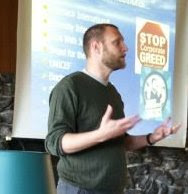"This Man's Blood"
Jesus' disciples cannot stop talking about Jesus - and talk about Jesus is teaching about Jesus (which is why, incidentally, neo-orthodox theologians get so upset by historians and people like The Jesus Seminar who want to talk "about" Jesus... their "talk" becomes teaching about Jesus). As soon as the apostles get out of jail (either by escaping or by being set free), they return to talking all over Jerusalem about Jesus. And at this point, it is likely that whatever they say, even if it is the most orthodox Jewish claim, will be spoken and heard through the filter of making some statement about Jesus.
Is Luke being deliberately ironic when he has the high priest say to the disciples that they "are determined to bring this man's blood on us"? What the high priest means, of course, is the guilt of a condemned and executed criminal, perpetuating whatever crime of treason or disorder of which Jesus was convicted. But in another way, what the disciples are doing is precisely that: to bring Jesus' blood on all of them - spread recognition of Jesus' act(s) of sacrifice and opening the way to redemption. The high priest was exactly right about what the apostles were wanting to do, but misunderstanding it himself. (The continuation of the motif of misunderstanding is another link to Luke's Gospel - but here the high priest is in the position of the disciples in the Gospel: having heard the teachings but misunderstanding what they mean or imply, and being instead filled with confusion and fear of reprisal from earthly powers.)
The apostles do want to bring Jesus' blood on the people - but not as condemnation but as redemption, not as imprisonment but as liberation, not as a death-sentence but as new life.
Peter answers, however, the question of the high priest: "We must obey God rather than any human authority." What a perfect summary of principled disobedience. It is a more-articulate echo of an earlier similar confrontation a few verses previous (4:19). This is why Martin Luther penned his 95 theses; why Martin Luther King, Jr., led the bus boycott and spoke against the Vietnam War; why Gerrard Winstanley, Conrad Noel, Cesar Chavez, John L. Lewis, Rev. Lewis Bradford, and Hugh Thompson Jr., disobeyed and acted righteously: Holy (Dis)Obedience. Obedience to God supplants obedience to any human authority - something American Christians would do well to remember when the nation calls for war and vengeance. This new loyalty (and its political dimensions) is referenced again when Peter describes Jesus as "Savior": the Greek word "soter" was used to describe the Roman Emperor and the Roman gods. By using this politically-charged word Peter was making a statement about political loyalties and calling the religious leaders of Jerusalem on their collusion with an oppressive occupying power (instead of, presumably, principled disobedience of some kind).
Peter continues this inversion of expectations by actually highlighting Jesus' criminal conviction and violent end. Luke has Peter reference Jesus being hung on a tree. Is Luke taking some dramatic poetic license here in describing the cross as a tree? (It seems most contemporary Christians sing with this kind of language this way, as if Peter was euphemistically describing the wooden cross as a tree.) In Deuteronomy (21:22-23) hanging the body of an executed criminal on a tree was an act emphasizing his accursedness. It was a such a potent symbol of accursedness that it was not allowed to remain overnight, lest it defile the whole of the country. Luke is taking poetic license here, but not in describing the cross as a tree. Luke is using hyperbole in describing the general sense of accursedness attributed to Jesus. He wasn't just condemned, tortured and executed as a criminal by the Romans, the general impression is that Jesus was condemned and cursed by God! How much more powerful is the reversal of fortunes if this man so profoundly cursed is not only redeemed but exalted to the right hand of God, and declared Soter?!
Peter here is one-upping the high priest in describing the misfortune of Jesus, as if to say that no matter how bad you think Jesus was, we can go even further. Even more to say: no matter how much we describe his accursedness in this world, so much more profound is the work God has done (is doing) in/through Jesus and his redemption. Luke has Peter almost grandstanding in court (reflecting a fine twist of language that is characteristic of skilled Greek rhetoric), which makes it more understandable why the council before which Peter is speaking becomes enraged at his statements.
Finally, something that impresses me is that in this confrontation the apostles make no reference to Jesus' resurrection as part of the kerygma or message. They speak of exaltation, but not resurrection. Why is that? Was it just an oversight on the part of the author, or something more deliberate? Was the bodily resurrection (a notion popular at that time, so there was no reason to exclude it from the testimony of the apostles) not important to the message the disciples were spreading?
Something for me to chew on... and take comfort in. The fundamental of the kerygma is transformation, repentance, metanoia.
At least, in front of that council.
Labels: Acts, America, Deuteronomy, Midrash



0 Comments:
Post a Comment
<< Home